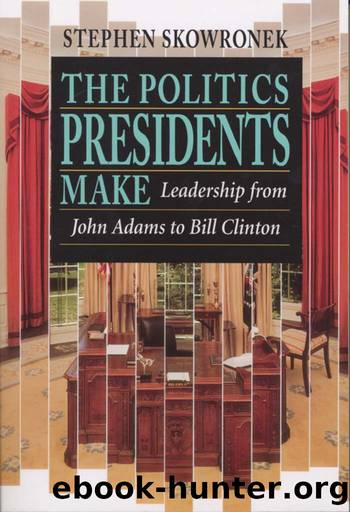The Politics Presidents Make: Leadership From John Adams to Bill Clinton by Stephen Skowronek

Author:Stephen Skowronek [Skowronek, Stephen]
Language: eng
Format: epub
Tags: Leadership, History & Theory, United States, Political Science, Political Process, History, Politics, General
ISBN: 9780674689374
Google: 6RUf5eY15T0C
Goodreads: 90469
Publisher: Belknap Press
Published: 1993-10-01T00:00:00+00:00
The Precedents of Wartime
Leaving the American people as much freedom as possible to âfight their own battles in their own communitiesâ was not, Hoover admitted, the âeasy wayâ out of the crisis. Still, he insisted, it was âthe American way.â40 Great principles were at stake in ensuring that the governmental response to human suffering was technically correct, and Hoover was nothing if not a master-craftsman of the technically correct response. The crisis was deepening; Hooverâs reputation as a reformer was collapsing; his political support was evaporating. And yet the President kept himself going with new initiatives that by his own lights were still consistent with his rules of appropriate action.
As the summer of 1931 dragged on, Hoover could see that something more would be needed to save his administration and the larger Republican regime it existed to preserve. There were signs aplenty that a âhealing processâ was not under way and that the American people were getting tired of hearing about what their cherished principles forbade their government to do. It was becoming increasingly clear that his âAmerican wayâ would not survive his political defeat. The question was, could he save himself from defeat without destroying his American way?
In an emergency meeting with the nationâs bankers in the fall, Hoover gave voluntarism one last try. He threatened direct governmental control of the nationâs finances along the lines of the War Finance Corporation of the Wilson years unless a voluntary association of creditors was formed immediately to administer relief to solvent banks that were experiencing difficulties. But even the bankers were becoming impatient with the Presidentâs precious precepts about appropriate action. Much to Hooverâs surprise, they discounted the prospects for voluntary cooperation and asked for the threatened federal action. Hoover promised to comply in the upcoming Congress if voluntary action undertaken immediately failed to have the desired effect.
Under these terms, terms which doomed the experiment before it began, the bankers agreed to form the National Credit Corporation.41 The near-immediate failure of the corporation angered the President and further tainted his administration. At a time when many who needed relief most saw the bankers as the source of their problems, Hoover had once again placed his faith in the power of the old financial houses to bolster the economy. Not only did the bankers fail to get the job done, they reinforced the image of a president hostaged to the money changers and impervious to the plight of the common people. Again Hooverâs central claim to legitimacy, his American way, appeared more a part of the problem than the solution. As the technocratic pretensions of Hooverâs initial leadership posture were stripped away, the ideology and interests that they protected became increasingly vulnerable.
Nonetheless, the President rebounded. If there was anything for Hoover to salvage from the bankerâs debacle, it was a rationale for transcending his own discipline. Now not even the most stalwart conservative could accuse him of having failed to explore the full potential of private initiative to meet the deepening crisis.
Download
This site does not store any files on its server. We only index and link to content provided by other sites. Please contact the content providers to delete copyright contents if any and email us, we'll remove relevant links or contents immediately.
The Borden Murders by Sarah Miller(4313)
The Secret Barrister by The Secret Barrister(3699)
Police Exams Prep 2018-2019 by Kaplan Test Prep(2540)
Coroner's Journal by Louis Cataldie(2476)
The Splendid and the Vile by Erik Larson(2458)
Terrorist Cop by Mordecai Dzikansky & ROBERT SLATER(2072)
A Colony in a Nation by Chris Hayes(1927)
My Dark Places by James Ellroy(1926)
The Art of Flight by unknow(1873)
Black Klansman by Ron Stallworth(1790)
Objection! by Nancy Grace(1778)
A Life of Crime by Harry Ognall(1728)
The New Jim Crow by Michelle Alexander(1702)
Anatomy of Injustice by Raymond Bonner(1664)
American Prison by Shane Bauer(1656)
Invisible Women by Caroline Criado Perez;(1640)
Whoever Fights Monsters by Robert K. Ressler(1616)
Obsession (The Volkov Mafia Series Book 1) by S.E Foster(1575)
A is for Arsenic: The Poisons of Agatha Christie (Bloomsbury Sigma) by Kathryn Harkup(1538)
